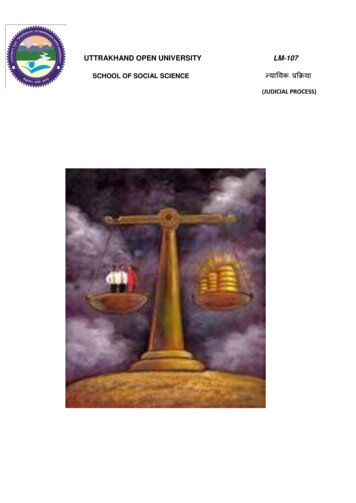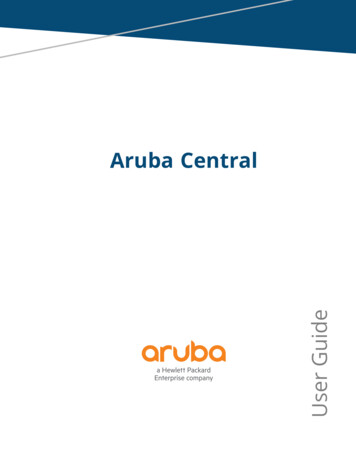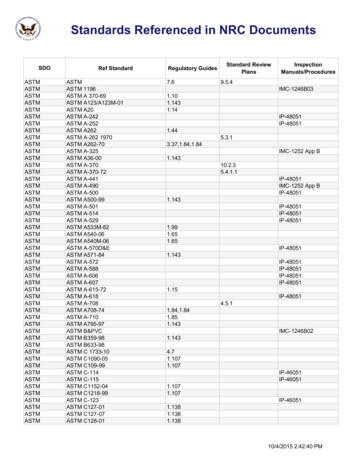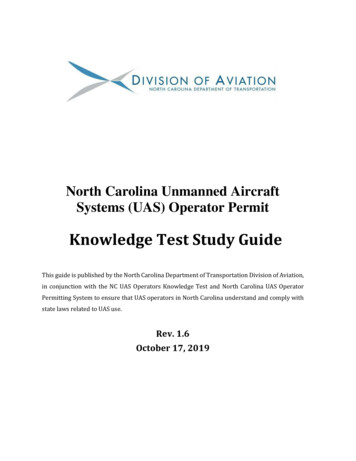
Transcription
UTTRAKHAND OPEN UNIVERSITYSCHOOL OF SOCIAL SCIENCELM-107न्याययक प्रक्रिया(JUDICIAL PROCESS)
Expert CommitteeProf. K.C. JoshiRtd. Vice ChancellorKumaoun University, NainitalProf. Girija Prasad PandeDirector School of Social SciencUttrakhandOpenUniversity,HaldwaniProf. Harbansh DixitPrincipalMaharaja HarishchandraP.G. College (Moradabad)U.P.Prof. P.C. JoshiHOD Law DepartmentSSJ Campus AlmoraKumaoun University, NainitalMr. Narendra Kumar JaguriAcademic AssociateLaw DepartmetUttrakhand Open UniversityHaldwaniCourse Coordination & EditingMr. Narendra Kumar JaguriLaw DepartmetUttrakhand Open UniversityHaldwani, NainitalUnit WritersNo. Of UnitDr. Dinesh Kumar Sharma1-12Assistant ProfessorLaw DepartmentGov. Law CollegeGopeshwar (Chamoli)Narendra Kumar JaguriAcademic AssociateLaw DepartmentUttarakhand Open UniversityHaldwani (Nainital)13
Copy Right @UTTRAKHAND OPEN UNIVERSITYEdition% June 2013Publisher % Director Study & Publishmail : studies@uou.ac.inUttrakhand Open University, Haldwani (Nainital) &263139UTTRAKHAND OPEN UNIVERSITYHALDWANILL.M.-12न्याययक प्रक्रिया(JUDICIAL PROCESS)BLOCK-1 Nature of judicial processPage- 1-83Unit-1- Judicial process as an instrument of social ordering; the tools and techniques of creativityand precedentsPage-1- 27Unit-2-Judicial process and creativity in law- common law model-Legal Reasoningand growth of law- change and stability.Page-28-51Unit-3-Legal development and creativity through legal reasoning under statutory andcodified s.Unit-4-Notions of judicial review; Role in constitutional adjudication - various theories ofjudicial role.Page-84-104Unit-5-Tools and techniques in policy-making and creativity in constitutional adjudication.Page-104-134Unit-6- Problemsof accountability and judicial law-making.Block- III- The Concepts of JusticeUnit-7-Page-135-155Page-156-234The concept of justice or Dharma in Indian thought; Dharma as the foundation oflegal ordering in Indian thought and sources.Page- 156-178Unit-8- The conceptand various theories of justice in the western thought. Page-179-206
Unit-9- Varioustheoretical bases of justice: the liberal contractual tradition, the liberal;utilitarian tradition and the liberal moral tradition.Page-207-234Block- IV : Relation between Law and JusticeUnit-10- Equivalence Theories- Justice as nothing more than the positive law of thestronger class.Unit-11- Dependency theoriesPage- 235-354Page-235-269- For its realization justice depends on law, but justice isnot the same as law.Page-270-303Unit-12- The independence of justicetheories - means to end relationship of lawand justice; the relationship in the context of the Indian constitutionalordering.Page-304-328Unit-13- Analysisof selected cases of the Supreme Court where the judicial process canbe; seen as influenced by theories of justice.Page- 329-354
JUDICIAL PROCESSLM-107LL.M. Part-2Subject: JUDICIAL PROCESSBlock I- Nature of judicial processUnit-1- Judicial process as an instrument of social ordering; thetools and techniques of creativity and precedentsSTRUCTURE1.1 INTRODUCTION1.2 OBJECTIVES1.3 What is judicial process?1.4. Judicial process as an instrument of social ordering1.5 The tools and techniques of creativity and precedents1.6 SUMMARY1.7 SUGGESTED READINGS/REFERENCE MATERIAL1.8 SELF ASSESSMENT QUESTIONSUTTARAKHAND OPEN UNIVERSITYPage 1
JUDICIAL PROCESSLM-1071.1 INTRODUCTIONThe judiciary is one of the pillars on which the edifice of theconstitution is built. It is the guiding pillar of democracy, what ishappening inside it is a fascinating study. Its logbook shows thatoften the judgments of the Apex court degenerated into a dismalfailure. There are many self inflicted wounds. This is the story of 59years of the Supreme Court.In this unit we shall discuss about the concept, definition, and natureof judicial process. We shall also read about the judicial process asan instrument of social ordering apart from that the tools andtechniques of judicial precedents shall also be discussed so as tounderstand the whole concept of judicial process.1.2 OBJECTIVESAfter reading this unit you will be able to: Understand the concept, definition, and nature of judicialprocess. Discuss the judicial process as an instrument of socialordering. Describe the tools and techniques of judicial precedents inIndia.1.3 WHAT IS Judicial process?―Judicial Process‖ means any judicial proceeding in connection withthe dispensation of justice by any court of competent jurisdiction and―Social Ordering‖ means activating the instrument of JudicialProcess in setting right the wrong done or eliminating injustice fromthe society. But here we are mainly concerned with role of theUTTARAKHAND OPEN UNIVERSITYPage 2
JUDICIAL PROCESSLM-107constitutional courts evolving new juristic principles during thecourse of judicial process for upholding social order keeping in viewthe need of fast changing society. Therefore, it would be appropriatetoexamine as to whether Judicial Process, is an instrument of socialordering?So, what exactly judicial process is?Everything done by judge in the process of delivery of justice iscalled Judicial Process .It basically confines itself to the study of ―is‖to ―ought‖ of the law.Or,Judicial process is basically ―whole complex phenomenon of courtworking‖ and what went wrong with this phenomenon is the issue inmy current project.The judiciary is one of the pillars on which the edifice of theconstitution is built. It is the guiding pillar of democracy, what ishappening inside it is a fascinating study. Its logbook shows thatoften the judgments of the Apex court degenerated into a dismalfailure. There are many self inflicted wounds. This is the story of 59years of the Supreme Court.Speaking of the Supreme Court of United States of America,Jackson J., of the court said,“we are final, not because we are infallible, we are infalliblebecause we are final.” The judgments of the Supreme Court arefinal but not infallible. They require constructive criticism,especially to take them out of the morass of alien concept andideas foreign to the land and culture. The Supreme Court isvirtually the proverbial ivory tower, with the judges sitting onthe top. Disturbed by some of its judgments, Pt. Nehru oncesaid in a diatribe, “judges of the Supreme Court sits on ivorytowers far removed from ordinary men and know nothing aboutthem.” The Supreme Court is sometimes said to be beyond thereach of a common person.UTTARAKHAND OPEN UNIVERSITYPage 3
JUDICIAL PROCESSLM-107Now, a question arises;What is justice? Is an age long question since the beginning ofcivilization? It is an elusive term. What appears justice to one personand from one viewpoint may be injustice to another or in anotherprospective. We cannot have such elusive concept as a yardstick.There must always be some objectives test to form a foundation ofjust society. Jurisprudence formulates that test as ―justice accordingto rules‖. Therefore, W. Freidman said, ―justice is an irrationalconcept‖. He concludes that justice as a generally valid concept isthe goal to which every order aspires as a ―purposeful enterprise‖.The question arises as to what actually went wrong to judicialprocess in India? Because the Supreme Court, instead of searchingand basing its judgments on first principles or fundamentals ofjurisprudence has sometimes has taken a shortcut by resorting tothe supposed fiat of article 142. This article was employed as a toolto pass final decisions, apart from and without recourse to the law ofthe land. The concept of expanding universe is not confined toastronomy alone. There is fast expanding judicial firmament. Theexpansion of judicial world sometimes reads on fields occupied andreserved for others. It is very necessary that Supreme Court act withself restraint. Let us remember the proverb, ―power corrupts andabsolute power corrupts absolutely‖.Critical analysis of the present system of Judicial ProcessAn introductory analysis of Indian judicial process:A vision of equal, expeditious and inexpensive justice for India‘smillions, a passion for effective delivery of social justice for thevictimized masses and a mission of constitutional fulfilment througha dynamic rule of law geared to democratic values, operated by afearless judicial personnel with a positive people orientedjurisprudence broad based an access to a sensitive, streamlined,functional jurisprudence- that is the command of the Preamble to theConstitution and the categorical imperative of Article 39-A. Oursocialist Republic now hungers for human justice through human lawand staggers towards nowhere since courts have lost their credibilityUTTARAKHAND OPEN UNIVERSITYPage 4
JUDICIAL PROCESSLM-107and are writing their own obituary through retiring chief justices.Today judicial justice has come to a grinding halt, the judicature hascaricatured itself and the Bench and the Bar, alas, have become alaw into themselves, Indian humanity having alienated itself from thefeudal forensic system and the cult of the robbed process. If all thejudges and lawyers of India pull down the shutters of their law shopsnationwide, injustice may not anymore escalate, if at all, litigativewaste of human and material resources may be obviated.Now, a situation arises that the entire Indian justice system is nowunder severe threat. With the police force that has been condemnedby everyone as being incompetent and corrupt, with the prosecutionsystem that is inept and selective and a judiciary that is corruptwhere is the room for justice in the Indian context?Indian Judicial system has collapsed totally. Be it the justice deliverysystem existent in criminal side or civil side, there is no hope forjustice for common man. Entire fabric has been exploited anddoomed. The condition of Indian judicial system worsened so muchthat Attorney General of India, Mr. Soli Sorabjee remarked, ―CriminalJustice system in India is on the verge of collapse owing toinordinate delay in getting judicial verdict and many a potentiallitigant seem to take recourse to a parallel mafia dominated systemof 'justice' that has sprung up in metros like Mumbai, Delhi etc‖."Hamlet's lament about the laws delays still haunts us in India andthe horrendous arrears of cases in courts is a disgraceful blot on ourlegal system, especially the criminal justice delivery system," Strikingan alarm bell, Sorabjee said: "criminal justice system is on the vergeof collapse. Because Justice is not dispensed speedily, people havecome to believe that there is no such thing as justice in courts."This perception has caused many a potential litigant who has beenwronged to settle out of court on terms which are unfair to him or tosecure justice by taking the law into his own hands or by recourse toa parallel mafia dominated system of 'justice' that has sprung up inmetropolitan centers like Mumbai.UTTARAKHAND OPEN UNIVERSITYPage 5
JUDICIAL PROCESSLM-107"The gravity of this development cannot be underestimated. Justicedelayed will not only be justice denied, it will be the rule of lawdestroyed," he said The Attorney General said the time has come toask, "Have the ideals of justice, liberty, equality and fraternityproclaimed in the preamble in grandiloquent language been realisedin the working of the Constitution during the last 53 years? Have weredeemed our tryst with destiny? Have fundamental rights beenmerely in the realm of empty rhetoric or have become living realitiesfor the people of India.‖Mutual appreciation of society of judges andadvocates constitute extra constitutional power and this lead toimbalance of power spectrum in society. What we need is, whateverthe SC said, don‘t take it as gospel of God. We should be able todiscover the truth; we should be able to analyze that whether theparticular question is in conformity with Fundamental Rights. Weshould have the ability to identify what is wrong, where? Now, theanalysis of governmental functioning is ―the executive is failing, thelegislature is failing and the judiciary has failed.‖ Article 13(2) clearlyprovided ―the state shall not make any law which take away orabridges the rights conferred by this part and any law made incontravention of this clause shall, to the extent of the contravention,be void.‖Now, question arises, who is the custodian of this right? Theanswer is President of India under Article 60 and Governor underArticle 159. President is not bound to sign the Bill which isunconstitutional, as an obligation is imposed under Article 60 that heshall preserve, protect and defend the constitution and the law.There has to be unity of command to direct state and we havePresident and Governor for that purpose. Article 14 compels everyfunctionary including the judges to decide according to theprovisions of the Constitution.According to professor Burgess, the idea of complete constitution islike this:1.Amending power of the Constitution given under Article 368 of theConstitution.2. Liberty: consist in three modules:UTTARAKHAND OPEN UNIVERSITYPage 6
JUDICIAL PROCESSLM-107i. Declaration of libertyii. Guarantee of libertyiii. Suspension of liberty under Article 358 and 3593.Organs of Governmental power: legislature, executive andjudiciary.Professor Bluntschli, added one more,Presidential form of government has power to choose policy, whathe required is only support from legislature.If one analyze the recent opinion of CJI that judges are not bound todisclose their assests. What the CJI trying to do? He is just claimingunequal protection of law which is not guaranteed under Article 14 ofthe constitution as he is attempting to take more protection of law;therefore, the equality clause is violated by the judges.Education and economic development are the only two methodsmentioned of correctness under Article 46 of the Constitution. But inthe recent decision of SC regarding reservation policy for weakersection of the society is totally a blunder created by it. Nobody hasgrievance that the weaker section of society should prosper, but itdoes not mean robbing upper strata of society of their opportunitiesand development. Forward section of society cannot be pulled downto promote weaker section of the society. The basic funda is ―unlessthere is capacity building from primary level, reservation does nothelp.‖The answer of all the grievances are given under Article 14 of theConstitution but the judiciary lost the beauty of this particular Articlethrough classification. By and large Courts failed to deliver completejustice. Article 14 talks of restitutive justice and restitutive justice hasthe touchstone of time count. Moreover, procedural complexitiesshould not hamper the way to justice. As lay down by SC that if youmove the High court under Article 226 then you can come to SC onlyunder Article 136. What is this nonsense? Is it the denial to thepeople that by way of procedural complexities they cannot enforcetheir rights against the wrong doer? It is highly unconstitutional.Nobody can forfeit your right to move to SC under Article 32 if youUTTARAKHAND OPEN UNIVERSITYPage 7
JUDICIAL PROCESSLM-107exhaust your first remedy under Article 226, because it is violative tothe protection given under Article 14. What is wrong here is themanner of working, system is good enough to lead to equality.Judicial Process under the Indian ConstitutionJudicial process is basically the path or the method of attaining―justice‖. Justice is the approximation of the ‗is‘ to ‗ought‘. Judicialpower is involved in the legal ordering of facts and is under theobligation to approximate ‗is‘ with the ‗ought‘. This ordering isnothing but the performance of administrative duties. Supremacy oflaw implies that it is equally applied and nobody is above the law.Everyone is equal in the eyes of law so that a level playing field iscreated in order to strengthen parity of power.Indian Constitution adopted this principle in the form of Article 14and the Preamble which provide equality of status and opportunity.Thus, Constitution ensues to establish parity of power which requiresthat every person must be on the same plane. The wording of Article14 made it an ‗umbrella‘ Article under which all other rights, bothconstitutional and statutory, find protection. This is so because alllaws treat every individual with equality and the protection of laws isextended to all without any discrimination, then all others rights areautomatically enforced. This duty to extend equality before the lawand equal protection of the laws has been casts on the state.Article 256 makes it obligatory upon the executive of every state toensure compliance with the law made by Parliament and anyexisting law which applies in that state. The Union executive isempowered to give such directions to a state as may appearnecessary to ensure the compliance of the laws by the stateexecutive. Thus, according to Article 256, it is the duty of theexecutive to ensure compliance with the laws and that too in amanner that satisfies the mandate of Article 14.Article 256, is in fact, the reflection of the true tradition of theRajadharma Principles which regarded it the responsibility of theexecutive to deliver justice through affirmative executive action toUTTARAKHAND OPEN UNIVERSITYPage 8
JUDICIAL PROCESSLM-107ensure strict compliance with the applicable law. Article 256 statesthe whole mechanism to ensure the implementation of every law bythe executive power. It thus, envisages the delivery of justicethrough administrative mode. The administrative mechanism ofproviding justice as promised under Article 14 is provided in Article256. It is well established that the judiciary is the outcome of thedissatisfaction of the working of the administrative machinery. Theneed for a dispassionate judgment of the executive action has givenrise to judiciary. Essentially, the judiciary while resolving disputes isensuring implementation of laws. Thus, its functions are basicallyadministrative in nature. Law is always based on the policy when thejudiciary implements or reverse the action of the executive, thus,judiciary acts as a policy controller. This view has been endorsed byKarl Lowenstein who held that adjudication is basicallyexecution.[31]But the present Indian judicial system is by all accounts unusual.The proceedings of the Courts are extra ordinary dilatory andcomparatively expensive. A single issue is often fragmented into amultitude of court actions. Execution of the judgment is haphazard,the lawyer seem both incompetent and unethical; false evidence isoften commonplace; and the probity of judges is habitually suspect.Above all, the courts often fail to bring the settlement of disputes thatgive rise to litigation. The basic reason for this state of affairs is thatpresent mode of access to justice through courts operating in India isbased on Adversarial legalism. This is where the power structuregiven in the Constitution has been distorted. As per Article 53(1) theexecutive of the power vested in the President, who has taken theoath to preserve, protect and defend the Constitution.Therefore, we can say that effective justice dispensation through theCourts requires three elements: access to courts, effective decisionmaking by judges, and the proper implementation of those decisionsbecause the primary responsibility of judiciary is policy control anddispute resolution is only incidental to it.Conclusion and SuggestionsUTTARAKHAND OPEN UNIVERSITYPage 9
JUDICIAL PROCESSLM-107In today‘s era, it becomes crystal clear that our judicial process is onthe verge of total collapse. The adversarial system which Indianlegal system follows has failed to answer the test of Article 14 readwith Article 256 as it is required party must do everything frompaying court fees to execute the decree which actually is the task ofthe state.Constitution is the supreme law of the land governing conduct ofgovernment and semi governmental institutions and thier affairs.Inancient India king is the fountain head of justice. Sage Yajnavalkayadeclared that ―the king, divested of anger and avarice, andassociated with the learned should investigate judicial proceedingsconformably to the sacred code of laws‖. In ancient India, legalprocedure is governed by the principles of Rajadharma. All theDharmas merged into the philosophy of ‗Rajadharma‘ and it wasparamount Dharma. It is a classic example of trans-personalizedpower system.The adversarial system lacks dynamism because it has no lofty idealto inspire. It has not been entrusted with a positive duty to discoverthe truth in the inquisitorial system. When the investigation areperfunctory and ineffective. Judges seldom take any initiative toremedy the situation. During the trial, the judges do not bother ifrelevant evidence is not produced and passive role as they don‘thave any duty to search for the truth. As the prosecution has toprove the case beyond reasonable doubt, the system appears to beskewed in favour of the accused. It is therefore, necessary tostrengthen the adversarial system by adopting with suitablemodifications some of the good and useful features of theinquisitorial system.How to reform judicial process?An epiloguic thought repeating what has been said earlier may beneeded to strength our submission that the court will commit blunderif it does not guard its reputation more seriously. A post script in thisprospective, may drive home my point, treating the Bench and theBar as a complex agency of public justice. A learned Judge mild inUTTARAKHAND OPEN UNIVERSITYPage 10
JUDICIAL PROCESSLM-107his words, who retired last year from the Supreme Court, wrote withrestraint t o a former colleague of his still on the High Court, whatmakes poignant reading: ―the judiciary is sinking. The destruction isfrom within; it is for judges like you to restore the fast disappearingcredibility of the High Courts and the Apex court.‖ Equal protection ofthe laws is the fundamental right of the citizen which has a forensicdimension and procedural projection. The obligation of every courtfrom the summit to base is to afford the same facility for hearing ofcase to the rich and the poor, to the dubious billionaire to the bondedlabourer. Now, there exists a mutual appreciation of society betweenjudges and advocates which led to the failure of justice deliverysystem. The judiciary is the fiduciary of people‘s justice and hasaccountability to the country for scrupulously equal judicial process.The crisis is not resolved by some martyrs from the class ofadvocates courting displeasure by exposure of oblique events but bya people‘s movement which will compel the judges and advocatesagainst the privatisation of judicial process. Your monopoly obligatesaccountability and if there is culpability it cannot be gagged bycontempt proceedings. In our system, both the robe and the gownmust remember is that the court is what the court does. The newdimension of justice delivery and new vision of alternative justicingwill have to be explored and executed if the first promise of theConstitution were to be actualised. Therefore, today, in adversarialsystem of justice, what we need to reform are:Court fees to be abolished:The purpose of justice is delivering the promise of law and hence therole of state is not merely limited to establish the judicial institutionsbut also to fulfill the expectations of the people which they attachedto the state while conferring role and seat of power. To charge feesfor justice is like sealing the promise of law and flouting theconstitutional duty of state to provide justice to the people at theirdoor step, merely laying down the foundations of judicial shops andwashing their hands of from the process of justice delivery is notwarranted on the part of the state. To get revenue for theUTTARAKHAND OPEN UNIVERSITYPage 11
JUDICIAL PROCESSLM-107enforcement of rights and to charge it in rigorous ways, failure to paywould entail the justice not access able to because one cannotafford it in terms of money, is the misery and apathy, the courts inIndia are continuing with. The proper course would be abolition ofcourt fee because it seriously undermines the parity of powerprinciples as it places the richer one in advantageous position whichoffends the spirit of Constitutional goals.Advocate fees to be abolished:As it is clearly provided under the provisions of Advocates Act thatadvocates are the officers of the Court, then why the clients arebound to pay hefty fees to lawyers for contesting thier cases. Thereshould be provision for public advocates which are available toeveryone and should be paid by state.Selection of Judges:CJI committed blunder when in one of the most controversial casehe held that consultation by CJI means his consent. Here, by thisobservation the power of President is reduced to zero and wholespectrum of power given under the constitution is disturbed. Thejudges should be appointed by President only with the consultationof CJI and not by his consent.Moreover, the provision of advocates becoming judges after certainrequired years of practise should be abolished. Judges andadvocates are different profession and they should not beintermingled. There should not be any mutual appreciation ofsociety.Adversarial system to be abolished:The present adversarial system should be abolished and replacedwith inquisitorial system of justice. Judicial process is essentiallydeductive reasoning and it is to tell authoritatively what law is. Thejudge should take judicial notice of all the law. The judge is toinvestigate the case before him, by approximating ‗is‘ to the ‗ought‘,after the parties present their case. By virtue of Article 14 r/w 256,there should be an affirmative action by the policy implementingorgan. It should protect the citizen with thier affirmative action, justUTTARAKHAND OPEN UNIVERSITYPage 12
JUDICIAL PROCESSLM-107like the ancient Indian system. The present Indian legal system iscontinuing the colonial legacy where the ends justify the means, butsince now, we are living under the umbrella of a controllingConstitution, the means should justify the ends.The Limitation Act should be struck down:The Limitation Act should be stuck down as unconstitutional since itis violative of Article 14. Under Article 14 there is no distinctionbetween state action and private action. If any person fundamentalrights are infringe, how can the state fix a time limit to curtail the rightto move the court for justice. It cannot withstand the test of Article14, or the six counts of the power spectrum. Hence, Limitation Act,doctrine of Delay and Laches and procedural hassles areundoubtedly unconstitutional.Judges should not have any immunity:The judges should not have any immunity because the functions of ajudge is twofold; the judicial function is only to state authoritativelywhat law is. All others are administrative functions. The fundamentallaw is the Constitution and it is the only supreme authority. If judgescommitted any negligence or there is dereliction of duty on their part,then such judges should be punished under Section 166 of the IPCbecause they are the public officers and hence liable for punishmentfor negligence of duty.According to Rajadharma principles, the king himself is liable to bepunished for an offence, one thousand times more penalty than whatwould be inflicted on an ordinary citizen. Perhaps, it is high time thatthis principle is getting working especially as under the Constitutionnone is above the law and there is no immunity for crime. If judges ofthe Superior Court in China and Japan can be prosecuted andpunished for violations of law, why not in India which has a basicstructure command to ensure equal subjection of all to the law.Delays should be avoided:The delays in our legal system are well known. There 30 millioncases pending in various Courts. The average time span for disputeto be resolved through the court system is about 20 years. LitigationUTTARAKHAND OPEN UNIVERSITYPage 13
JUDICIAL PROCESSLM-107has become a convenient method for avoiding prompt retribution bymany people on the wrong side of law. The Bible says that the pathto hell is paved with good intention. The legal system is meant topunish the criminal and to protect the law abiding citizens. Many atime, the criminal exploits the legal process itself to escapepunishment.Supreme Court to have Benches throughout the country:Article 130 of the Constitution provides that the SC shall sit in Delhior in such other place or places, as the CJI may with the approval ofPresident. From time to time appoint. This provision of theconstitution has not been applied so far. If the SC has a seat onother places, that is seat in every state then it will be relief to theaggrieved and justice will be assessable to them, which will result inreduction of cost of litigation and will cause less hardship to thelitigant.No presumption should be raised in favour of anyone:The presumption is always in the favour of constitutionality ofstatute, and it is a gross misapplication of a justice as it tends topresume the preponderance of power in favour of one party and tiltsthe balance unjustly. This totally upset the balance of parity ofpower, which is ensured through the guarantee of ―equal protectionof laws‖ under Article 14 as well as Article 13 (2) and (3) of theConstitution, respectively. The burden of justifying the constitutionalvalidity of the law as well as the fact that the state action was inaccordance with such law should be on the state, and not on theperson who challenges its constitutional validity. Asking the injuredparty to prove the wrong or injury suffered destroyed the guaranteeof equal protection of laws. Such an opinion of the part of court isextremely low on the ethical count of the power spectrum.Judges should play active and not passive role while decidingcases:Article 14 of the Ind
3-Legal development and creativity through legal reasoning under statutory and codified systems. Page-52-83 Block-II-Special Dimensions of Judicial Process in Constitutional Adjudications. Page -84 155 Unit-4-Notions of judicial review; Role in constitutional adjudication - various theories of judicial role. .










